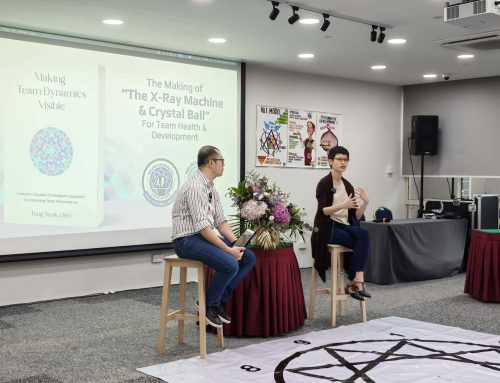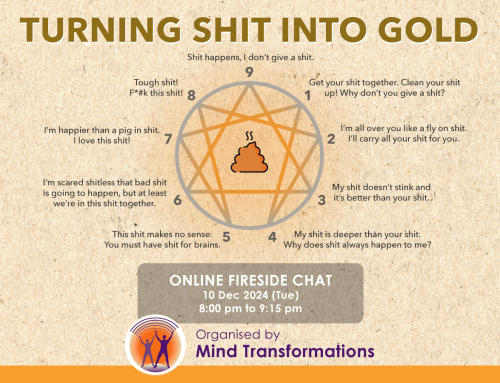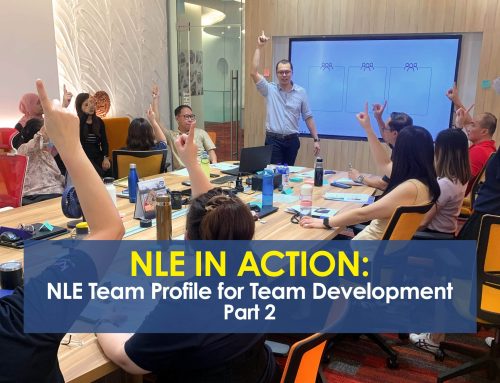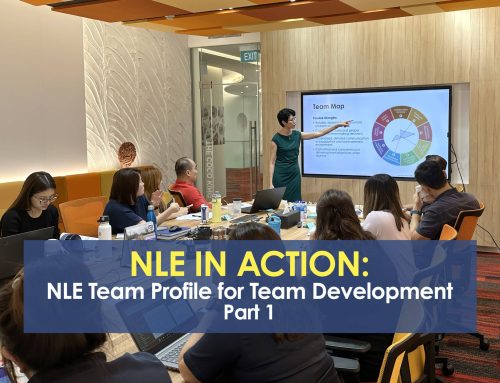By Seok Hian, Ian Lye and Joseph Ch'ng
Team dynamic is not constant. It is highly susceptible to environmental changes, such as the VUCA business landscape (volatility, uncertainty, complexity and ambiguity). It changes when there are new members/leaders joining the team. Most of all, the leader’s leadership style heavily influences the team dynamic.
There has been so much talk about great teams going further, together. But the “how” to enable healthy team dynamic has remained a management speak. When VUCA arrives, most teams and organisations suffer from attrition, disengagement and people drawing boundaries with one another.

This article covers the approach and framework practices we take a team, together with their leadership & management, through an experiential facilitation of high-impact conversations in helping them to build a learning & growth centric organisation. We’ll take you through the three types of team dynamics and small key differences that set the conditions for a regenerative team dynamic.
Build Regenerative Team Dynamic With Neuro-Linguistic Enneagram Team & Leadership Strategy
5-day experiential training for skills to facilitate team dynamic awareness, changing conversations in a team, team neuro-actionables
Access to the NLE Team System - highlight healthy & unhealthy team dynamic. For facilitators, one profile, multiple commercial opportunities. Sign up now to seize the one-time limited bonuses!
What is a learning & growth centric organization and why do they succeed when others don't?
In a learning & growth centric organisation, teams and leaders are aware and sensitive to their interactions with the external environment. They are driven and aligned by a shared, greater purpose, although they may have conflicting goals. They are “We”-focused, seeing the interdependent relations or ecology of the VUCA context. This systemic perspective allows them to be more collaborative and more eager towards driving “win-win” solutions. Greater shared purpose is the direction; “learning & growth” is the culture; experimentation and feedback are the approaches; deep problem-solving and sustainable impact are the outcomes.
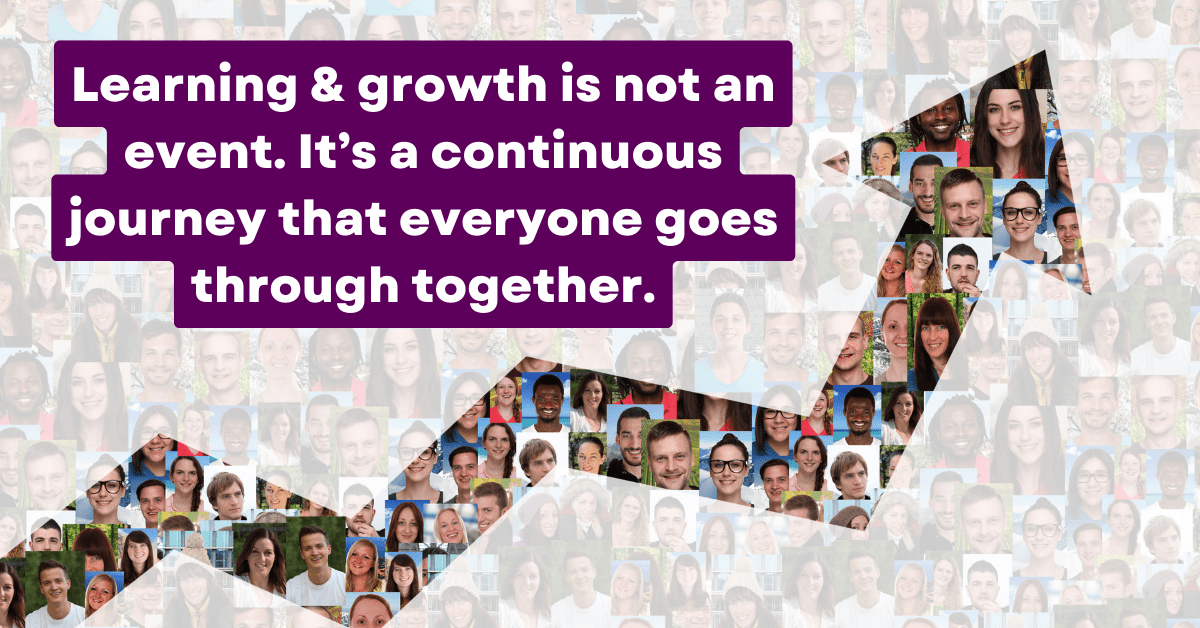
In such a team dynamic, learning & growth is not an event. It’s a continuous journey that everyone goes through together. The team becomes more curious, humble, and coachable. Leaders become more distributed and team-oriented. They focus on collective success more than individual achievement. As the team grows, they also invest in building team capacity & leadership as a unifying ecosystem rather than isolated or independent pieces, via mentorship, coaching and cross-pollination of experiences.
The key difference between a learning & growth centric organisation and other types of organisations is that the former thrives on a Regenerative Team Dynamic while the latter limits themselves in a status quo even if they are functioning well. In a non-regenerative team dynamic, we often see teams being siloed, with egocentric leaders. There is little to no trust or psychological safety, participation and learning within the team. With a Regenerative Team Dynamic, people show high levels of healthy changes in their daily behaviour, attitude, communication & mindset in response to the increasing demands of a volatile, uncertain, complex and ambiguous business environment.
Build Regenerative Team Dynamic With Neuro-Linguistic Enneagram Team & Leadership Strategy
5-day experiential training for skills to facilitate team dynamic awareness, changing conversations in a team, team neuro-actionables
Access to the NLE Team System - highlight healthy & unhealthy team dynamic. For facilitators, one profile, multiple commercial opportunities. Sign up now to seize the one-time limited bonuses!
What non-optimal team dynamic might you be facing and what can you do to improve it?
Today, we don't have a shortage of leadership and team models, best practices, or systems. The issue is that many of them aren't customized to the unique situation of each team or organization. Not only that, while they have their own value, each of these solutions only covers a specific scope and overlooks other significant areas.
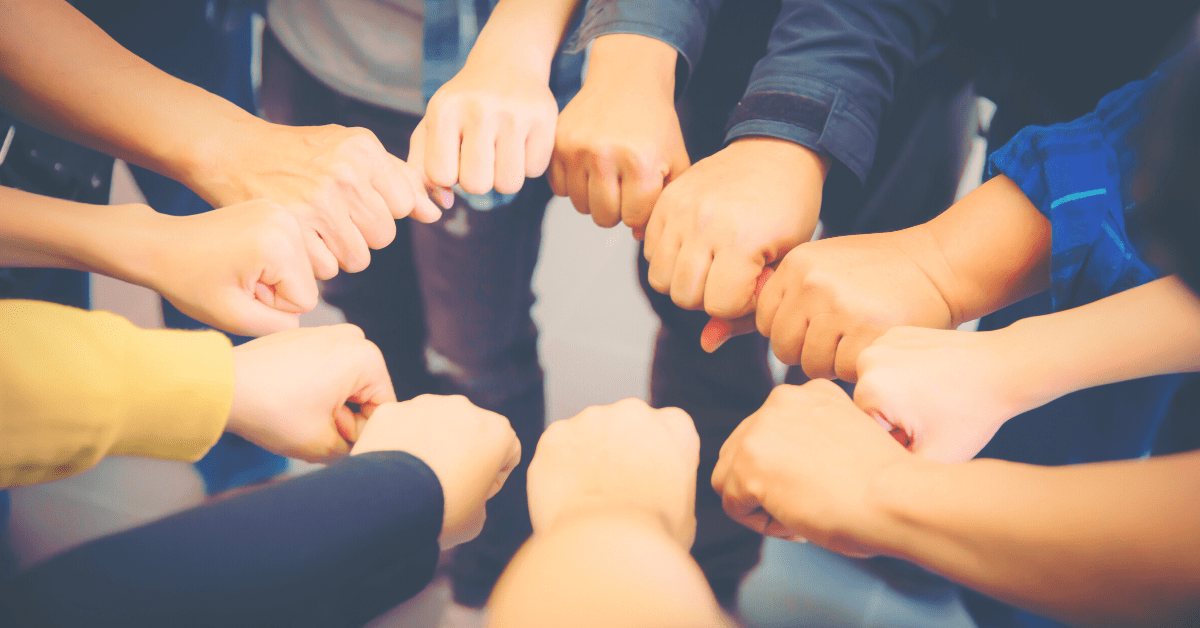
Each team or organization is unique with their own set of challenges, goals, strengths and weaknesses.
The personality of each individual, that contributes to the team dynamic, also determines the ‘health’ level of the team - how they show up and impact the organisation. And the personality of the team (including the leader) usually presents unresolved issues (“elephant in the room”) which can also be pivotal potential for growth.
Therefore, a "standardised or off-the-shelf" approach will not work. We need to be more agile and adaptive in our team building and leadership development programs.
Thus, your capacity to lead the discussion with a Team Map and a comprehensive understanding of the team's pivotal points of growth, which you can tap (as part of the tools from the Neuro-Linguistic Enneagram Team Leadership Program), then becomes an important asset for their success!
There are 2 key team dynamics that many organizations are dealing with, which can be further improved:
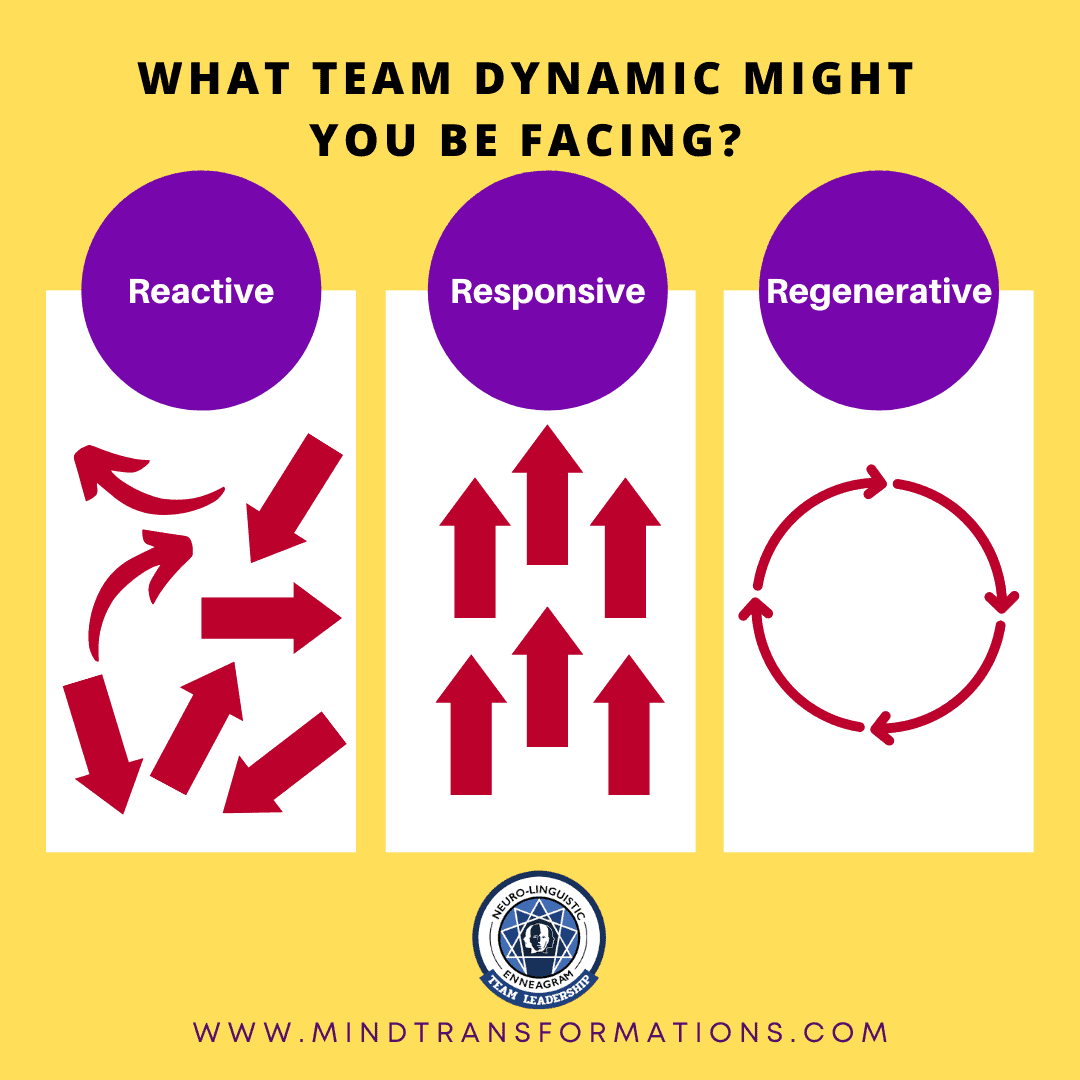
a) Reactive Team Dynamic
They are not focused on long-term goals or sustainability. They are "Me"-focused, meaning that they see the world as a zero-sum game where one team's success is another team's loss. This limits their ability to experiment and take risks that can benefit the organisation.
As they tend to be siloed within their domain or team, it limits their ability to be truly collaborative and see the bigger picture. Because of the lack of alignment across domains or outside the team, there is a lot of wasted effort and resources.
Team members are not truly empowered in many organizations. They often lack the deep analysis and systemic thinking skills needed to make an impactful difference.
When a team has a reactive dynamic, safety and encouragement for participation are crucial. If the learning is modest, don't be upset; your ability to facilitate a well-designed team debrief may serve as a foundation for the team to rebuild its effectiveness.
b) Responsive Team Dynamic
Overall, teams that operate with responsive dynamic can be quite efficient. Their shortcoming or blindspot is that they may be "My Team"-focused. They have a "we-versus-them" mentality and they focus on resolving concerns that affect the team but may not be ecological in the long run, such as with other departments or external parties. They prioritize the binary thinking of "either-or," not win-win.
The team's main disadvantage is that long-standing challenges are frequently left unresolved. Not only that, most solutions come from cooperation and compromise rather than from collaboration. Despite their strong team mentality, their lack of inclusivity may cause problems collaborating with other teams to develop lasting solutions for the company's development.
When a team has a responsive dynamic, you can maintain the safety (you may just need to watch out for a few specific people) and participation level while focusing your remaining effort in cultivating learning and alignment, particularly across domains. Teams at this level will walk away with insights and learnings.
How to create the conditions for success in your own team or organization through facilitating Regenerative Team Dynamic conversations?

In order to build a learning & growth centric organization, it is important to facilitate regenerative conversations with teams and leaders. We place a strong emphasis on a dynamic balance of asking tough questions that stretch their boundaries, honest self-reflection, and generating empowering alternatives that increase team participation and learning. We also provide psychological safety in groups and leaders to explore deeper into their understanding and perspectives, through accepting the spectrum of their cognition, feeling, attitude, motives, communication styles, and behaviors. It's critical to express appreciation genuinely while also focusing on alignment rather than agreement.

You can facilitate dynamic, in-depth, and well-organised discussions that foster a transformative leadership awareness and team conversations by employing the NLE Team Leadership framework.
By facilitating leadership awareness, you can help leaders:
- Understand their team dynamic and their impact on the team.
- Know how best to optimize their strengths to enhance team performance.
- Identify the key leveraging points to improve team dynamic & results.

You can also facilitate team conversations so that teams can:
- Understand and appreciate the diversity of the team dynamic & learn to navigate towards success and performance.
- Have a safe space (through a facilitated process) to talk about issues that can improve team performance.
- Change their conversations within the group to drive a different outcome.
If you want to create a learning & growth centric business, team dynamic and regenerative team discussions become your vital starting point. As a result, you can then provide the conditions for success within your team or organization that will also help you advance in your professional development.
Build Regenerative Team Dynamic With Neuro-Linguistic Enneagram Team & Leadership Strategy
5-day experiential training for skills to facilitate team dynamic awareness, changing conversations in a team, team neuro-actionables
Access to the NLE Team System - highlight healthy & unhealthy team dynamic. For facilitators, one profile, multiple commercial opportunities. Sign up now to seize the one-time limited bonuses!
Seok Hian is an HR & Organisation Development Consultant, as well as an Executive Coach. She specialises in leadership & team development, helping organisations to perform, scale and transform. The NLE Team Leadership programme is a distillation of her 20 years of HR, leadership and consulting experiences - into models, profiles and conversations that ignite change in organisations. Her clientele includes Lego Group, Bio-Rad, Omnicom Media Group, Tapestry, Carousell, Gushcloud, Hepmil, Funding Societies, Teambuild Construction Group, Publicis Groupe.
Ian Lye is a Trainer, Facilitator and Executive Coach. He specialises in experiential learning and safe conversations that enable teams to gain insights and fresh perspectives. The NLE Team Leadership programme is built with his specialisation in transformative conversations, how to be a facilitator that enables a safe space for people - coupled with his 20 years of experience using the Enneagram for coaching and team facilitation. His clientele includes DHL, NXP Semiconductor, KPMG, Cargill, Autodesk, Biotronik, Standard Chartered Bank, RHB Bank and numerous government bodies & dialogues with communities.
Joseph Ch'ng trains the ICI Coach Certification & NLE Certification at Mind Transformations. His mission is to contribute practicality & finesse in the applications of NLP and coaching

